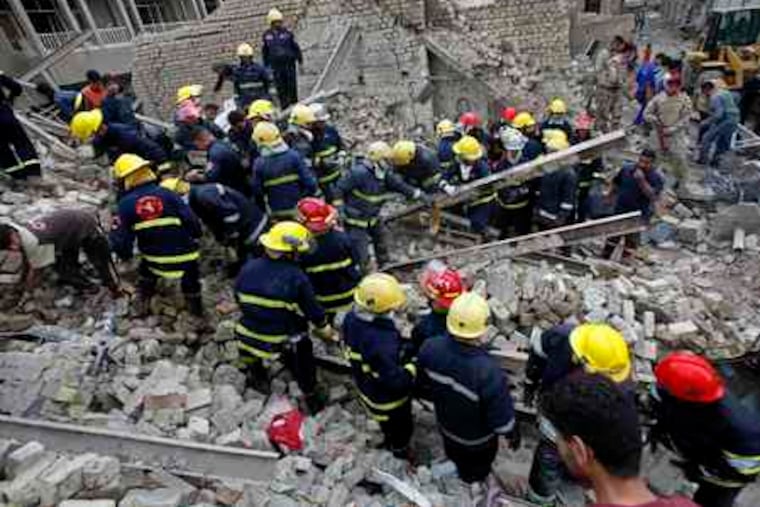Scores are killed in Baghdad blasts
BAGHDAD - Four large bombs exploded near education facilities, judicial complexes, and other high-profile targets in Baghdad yesterday, killing 127 people, according to police and health officials, and triggering recriminations against the Iraqi government and its security forces.

BAGHDAD - Four large bombs exploded near education facilities, judicial complexes, and other high-profile targets in Baghdad yesterday, killing 127 people, according to police and health officials, and triggering recriminations against the Iraqi government and its security forces.
The Health Ministry said 513 people were wounded.
The blasts, which occurred minutes apart shortly after 10 a.m., fueled fears that elections - scheduled yesterday for March 7 - as well as the continuing withdrawal of U.S. forces, will usher in a new phase in the battle for control of Iraq.
Although that fight is now unfolding primarily in the political arena, many Iraqis fear a rise in violence could destabilize the country and reignite armed sectarian combat.
Officials of the Shiite Muslim-dominated government accused the Sunni insurgent group al-Qaeda in Iraq of responsibility for yesterday's carnage, the latest in a campaign of powerful bombings apparently designed to undermine the Shiite-led government, which insurgents deride as a by-product of the U.S. occupation.
Al-Qaeda in Iraq has little support among Iraqis, but the anger and sense of impotence apparent here yesterday suggested that with each devastating attack the insurgents succeed in portraying the government as feeble and incompetent.
"Everyone knows that the interior minister doesn't speak to the prime minister because of political problems," Shiite lawmaker Nasar al-Rubaie said during a televised parliamentary session in which lawmakers chastised security commanders and key ministers.
Prime Minister Nouri al-Maliki and Interior Minister Jawad al-Bolani lead rival slates vying for seats in the forthcoming parliamentary elections.
"How can we provide security for Iraqis with security ministries that respond to political parties?" Kurdish lawmaker Mahmoud Othman lamented.
The Baghdad security command, which reports to Maliki, provided a lower death toll, saying 77 people had died in the explosions.
Two of four statements it issued about the bombings lambasted media coverage. It described journalists with one Western agency as "liars" and said it would sue an Iraqi television station for "defamation, abuse, and incitement to violence."
In a statement, Maliki blamed the attacks on "remnants" of Saddam Hussein's Baath Party and on al-Qaeda in Iraq. The prime minister accused the attackers of "gloating in the blood of our innocent" and attempting to "abort our democratic experiment."
Lawmakers scheduled a special session for tomorrow to review the government's response to the latest attacks and its investigations into bombings in August and October that left key ministries in ruins and killed more than 255 people.
As U.S. troops sharply downscaled their presence in Iraqi cities in the summer, Maliki hailed the first phase of their withdrawal as a "victory" for Iraq, and many Iraqis took to the streets, dancing and proclaiming their new sovereignty.
Days later, Maliki's government said it would start dismantling the ubiquitous concrete blast walls that reminded Iraqis daily of the dangers that have come to shape their lives.
The recent carnage has given those celebrations a retrospective air of hubris and led Iraqis to fear their country was not yet on the mend.
One of the explosions yesterday occurred outside a bank in central Baghdad that was being used as a temporary headquarters for the Finance Ministry, which was destroyed in one of the August bombings.
Another blast took place outside the Judicial Institute, where judges are trained.
The third occurred in the parking lot of the Karkh district courthouse, after an attacker plowed through a checkpoint and detonated explosives as guards opened fire. The building is adjacent to a fine-arts academy near a children's cultural center.
The fourth explosion occurred in the southwestern neighborhood of Dora, near a technical institute.
Plumes of smoke rose over the capital, darkening an already overcast, chilly day. American Apache helicopters buzzed above as Iraqi emergency vehicles rushed from the bomb sites to hospitals.
Iraqis, notoriously hardened after years of sanctions and war, lashed out at their leaders for failing to keep the populace safe.
"We don't care who ends up leading us as long as it's safe again," said Delal Mahdi, a woman in a black abaya who was walking by the Karkh courthouse. "At this point, even if it's an Israeli, as long as he's a good person, we would agree."
Hours after the blasts, security officials cordoned off several streets, paralyzing traffic and forcing thousands of people to walk home.